
"Truly Madly Deeply" is a song by Australian pop duo Savage Garden, released in March 1997 as the third single from their self-titled debut album (1997) by Roadshow and Warner Music. It won the 1997 ARIA Music Award for both Single of the Year and Highest Selling Single and was nominated for Song of the Year. Written by bandmates Darren Hayes and Daniel Jones, the song is a reworking of a song called "Magical Kisses" that the pair wrote together during the recording of their debut album.

"Please Stay" is a song by Australian singer and songwriter Kylie Minogue for her seventh studio album, Light Years (2000). The song was written by Minogue, Richard Stannard, Julian Gallagher, and John Themis and was produced by Stannard and Gallagher. Festival Mushroom Records and Parlophone released the song as the fourth single from Light Years on 11 December 2000. "Please Stay" is a disco song with a strong Latin pop influence. The song received generally positive reviews from music critics.

"Babylon" is a song by British singer-songwriter David Gray. Originally released on 12 July 1999 as the second single from his fourth album, White Ladder (1998), it was re-released as the album's fourth single on 19 June 2000. Described as Gray's signature song, "Babylon" is "about a love that is lost and found again".

"S Club Party" is a song by British pop group S Club 7. It was released on 20 September 1999 as the second single from their debut studio album, S Club (1999). The song was written by Mikkel Eriksen, Hallgeir Rustan, Tor Erik Hermansen, and Hugh Atkins and produced by StarGate.
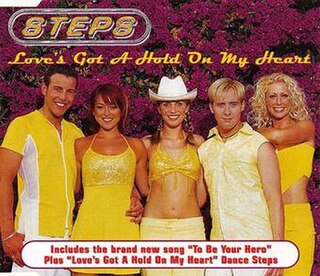
"Love's Got a Hold on My Heart" is a song by British pop music group Steps. It was released as the lead single from the band's second album, Steptacular (1999). The song features Faye Tozer and Claire Richards on lead vocals. The single peaked at number two in the United Kingdom and became a top-20 hit in Finland, Flanders, Ireland, and New Zealand.
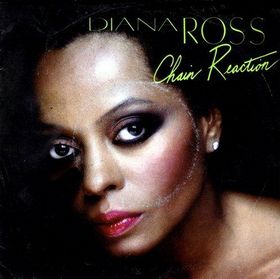
"Chain Reaction" is a song by American singer Diana Ross, released on November 12, 1985 by RCA and Capitol, as the second single from her sixteenth studio album, Eaten Alive (1985). The song was written by the Bee Gees and contains additional vocals from Barry Gibb. Sonically, "Chain Reaction" is an R&B and dance-pop song. According to the Gibbs' biography, the brothers had initial reservations about offering the song to Ross in case it was too Motown-like for her.

"I Try" is a song co-written and performed by American musician Macy Gray. Issued as the second single from her debut album, On How Life Is (1999), the song was first released in Japan as a double A-side with "Do Something" on July 23, 1999. Two months later, on September 27, "I Try" was released officially in the United Kingdom, where it topped the UK Hip Hop/R&B Singles chart and peaked at No. 6 on the main UK Singles chart. Globally, the song would be Gray's most successful single, peaking at No. 5 in the United States and Norway, No. 4 in Scotland, No. 3 in Austria, No. 2 in Canada, and No. 1 in Australia, Ireland and New Zealand. At the 2001 Grammy Awards, "I Try" won Best Female Pop Vocal Performance, and was nominated for Record of the Year and Song of the Year.

"I Want You" is a song by Australian pop duo Savage Garden, originally released in Australia on 27 May 1996 as the lead single from their eponymous debut album, Savage Garden (1997). The single reached number one in Canada and peaked at number four in Australia and on the US Billboard Hot 100. Much of the song's chart success in the US was the result of Rosie O'Donnell playing the song on several episodes of The Rosie O'Donnell Show. In the United Kingdom, the single was issued twice, achieving its highest peak of number 11 during its initial release in 1997.

"To the Moon and Back" is a song by Australian pop duo Savage Garden, released in Australia on 4 November 1996 as the second single from their self-titled 1997 album. It was the follow-up to their first hit "I Want You", and won the 1997 ARIA Music Award for Song of the Year. The song became the band's first number-one single in their native country, reached number three on the UK Singles Chart, and peaked at number 24 on the US Billboard Hot 100.

"Natural" is a song by English pop group S Club 7. It was released on 11 September 2000 as the second single from their second studio album 7 (2000). The track was written by Norma Ray, Jean Fredenucci, Cathy Dennis, and Andrew Todd. It is an English cover of Ray's 1999 hit "Tous les maux d'amour", both of which interpolate Gabriel Fauré's Pavane. Upon the song's release, it peaked at number three in the United Kingdom and reached the top 50 in Australia, Germany, and Ireland.

"Sunny Came Home" is a folk-rock song by American musician Shawn Colvin. It is the opening track on her 1996 concept album, A Few Small Repairs, and was released as a CD and cassette single on June 24, 1997. In the United Kingdom, the song was released in July 1997 but did not chart until a re-release in May 1998.

"Everybody" is a song by British pop group Hear'Say, written by Martin Harrington, Ash Howes, Richard Stannard, Julian Gallagher, and Andy Caine. Produced by Harrington and Howes, the track was recorded for the group's second studio album of the same name (2001), released nine months after their debut album, Popstars. "Everybody" was issued as the album's lead single on 26 November 2001 and was the final single released by the band before member Kym Marsh quit. Upon its release, the song peaked at number four on the UK Singles Chart. The song's music video is set inside a space capsule and shows the five band members dancing on a stage.

"Girlfriend" is a song by English singer and actress Billie, released in October 1998 as the second single from her debut album, Honey to the B (1998). It reached number one in the United Kingdom, making her the youngest and first female solo singer to reach the top spot with her first two singles. Outside the UK, "Girlfriend" peaked at number two in New Zealand and reached the top 20 in Ireland. On the American track listing for Honey to the B, the radio mix replaces the original album version. The B-side, "Love Groove", is also included on Honey to the B.
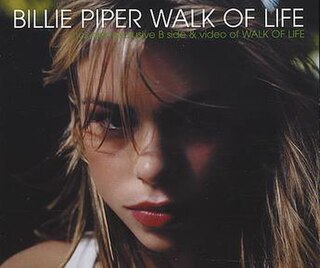
"Walk of Life" is a song by English singer Billie Piper, written by Piper and Wendy Page for her second studio album, Walk of Life (2000). It was released as Piper's final single in December 2000 following her decision to retire from the music industry. It was her first single to miss the top five in the United Kingdom, stalling at number 25 on the UK Singles Chart. The song's music video was directed by Jamie Morgan.

"Right Now" is the debut single of English girl group Atomic Kitten from their first album of the same name (2000). The song was re-recorded twice: once for the album's 2001 re-issue with new member Jenny Frost and again in 2004 for the group's Greatest Hits album. The 2004 version, titled "Right Now 2004", proved to be a greater international chart success. The song was written by Atomic Kitten founders and Orchestral Manoeuvres in the Dark members Andy McCluskey and Stuart Kershaw.

"Let Her Cry" is a song by American rock band Hootie & the Blowfish. It was released in December 1994 as the second single from their debut album, Cracked Rear View (1994), and became a top-10 hit in Australia, Canada, Iceland, and the United States. The song received the Grammy Award for Best Pop Performance by a Duo or Group with Vocals in 1996.

"Love Ain't Here Anymore" is a song by English boy band Take That. Released on 27 June 1994 by RCA and BMG, it was the sixth and final single taken from the band's second studio album, Everything Changes (1993). The song peaked at number three in the UK Singles Chart, ending their string of consecutive number-one singles. It failed to overtake Wet Wet Wet's cover of "Love Is All Around" at number one, and American R&B group, All-4-One, who reached number two with "I Swear". "Love Ain't Here Anymore" was re-recorded for release in the United States and included on their first Greatest Hits compilation in 1996.
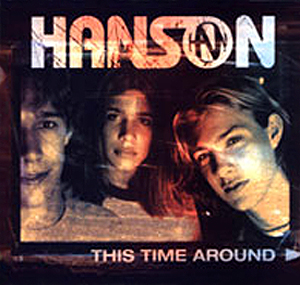
"This Time Around" is a song written and performed by American pop rock band Hanson. It was the title track and second single from the band's second studio album, This Time Around (2000). American singer Jonny Lang plays an electric guitar on the song. It was released as a commercial single in the United States and Canada on April 4, 2000.
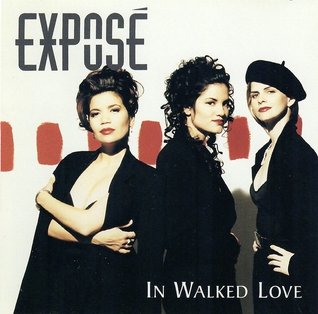
"In Walked Love" is a song by the American girl group Exposé. Written by Diane Warren and produced by Steve Thompson and Michael Barbiero, the song can be found on the group's 1992 album Exposé, their third studio album. Lead vocals on the pop ballad were performed by Ann Curless. The song features Al Pitrelli as guest guitarist. In 1996, British singer Louise covered the song and reached number 17 on the UK Singles Chart with her rendition.

"More Than I Needed to Know" is a song by British pop group Scooch. The song was written by Mike Stock, Matt Aitken, and Steve Crosby and was produced by the former two. It was released on 10 January 2000 as the group's second single from their debut album, Four Sure (2000), and reached number five on the UK Singles Chart the same month, becoming the band's highest-charting single in their home country. It also reached number 50 in Ireland and number 62 in the Netherlands. A music video made for the song features the four band members searching for pieces of their logo.




















